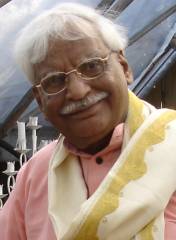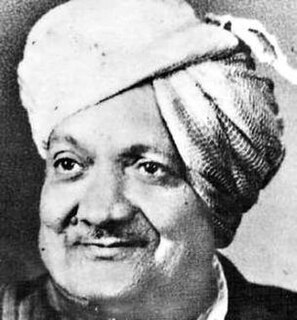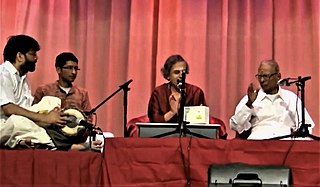
Purandara Dasa was a Haridasa philosopher-saint from present-day Karnataka, India. He was a composer, singer and one of the chief founding-proponents of Carnatic music. In honor of his significant contributions to Carnatic music, he is widely referred to as the Pitamaha of Carnatic music.

Pandeshwara Kalinga Rao was an Indian Bhavageete and Sugama Sangeetha singer and composer in the Kannada language.

Indian folk music is diverse because of India's vast cultural diversity. It is sung in various languages and dialects throughout the length and breath of this vast nation and exported to different parts of the world owing to migration.
Mysore Ananthaswamy was one of the pioneers of Kannada Bhavageethe in Karnataka. He was a very popular composer and singer of Kannada Sugama Sangeetha. He composed music for several poems and bhavageethe written by well-known Kannada poets like Kuvempu, K. S. Nissar Ahmed, N S Lakshminarayana Bhatta, etc., and popularized them throughout the globe. Some of his most famous songs include: Jogada Siri Belakinali, Jaya Bharata Jananiya Tanujate, O Nanna Chetana and Ede Tumbi Haadidenu.
Ananthaswamy played Mandolin in his early days which he purchased for 25 rupees. Later, he switched to Harmonium as there was a difficulty in fine tuning Mandolin.

C. Aswath was an Indian music composer and exponent of Bhavageete in the Kannada language. He was also a singer, and sang many of his own compositions. He was credited with singing Bhavageete songs and making sure that they reached the common man.

Kiladi Kittu is a 1978 Kannada film directed by K.S.R. Das. The film starred Vishnuvardhan and Rajinikanth in the lead roles. The music for the film was composed by Mohan Kumar. The director remade the movie in Telugu in 1981 as Black Cobra.

Karnataka Chitrakala Parishath is a visual art complex located in Bangalore. The complex has 18 galleries. 13 of these galleries carry a permanent collection of paintings, sculptures and folk art. The other galleries are rented out for exhibitions of works by artists of repute. The folk art collection showcases Mysore paintings and leather puppets. The Parishat runs the College of Fine Arts, a visual arts college. Each January, the Parishath organizes Chitra Santhe, a cultural event showcasing affordable art to the public. The motto of the event is "Art for All".

Balappa Hukkeri (1911–1992) was a singer of folk songs and Bhavageetes in Kannada language and a freedom fighter in his early years. He is mainly credited for popularizing Sugama Sangeetha in North Karnataka, just like P. Kalinga Rao who popularized the art form in South Karnataka. Several prestigious awards have been conferred to him including Sangeet Natak Academy award and "Karnataka Sangeeta Nataka Academy Award". Balappa was fondly called as ‛Saavira Haadugala Saradara’.

Rudrapatna Krishnashastri Srikantan, known as R. K. Srikantan, was a vocalist of the Carnatic musical tradition of South Indian music. He was awarded the Madras Music Academy's Sangeetha Kalanidhi in 1995.
Mysooru Mallige is a literary work of Kannada poet, K. S. Narasimhaswamy. The collection of poems inspired a movie made by T.S. Nagabharana and also a musical play by Kalagangothri. The book was first released in 1942 at Maharaja College. Due to its popularity, the book was often presented in marriages and it has been re-printed several times.
Raju Ananthaswamy was a music composer and director. He worked on Sugama Sangeetha for more than 15 years. He was the son of vocalist Mysore Ananthaswamy. He died in 2009, at the age of 35 years.
Manjula Gururaj is an Indian female playback singer and a voice-over artist who has primarily worked in Kannada cinema. She has, to her credit, many thousands of songs for successful soundtracks and many hundreds of Kannada light music songs. She is a recipient of Karnataka State Film Awards for her contribution in film songs and considered one of the most prominent playback singers during the late 1980s and throughout the 1990s.
Praveen D. Rao is an Indian musician, music director and a lyricist for Kannada language songs. He is based in Bangalore, India. He plays keyboard, tabla and others.
Sarada Vilas College, located in the city of Mysore, Karnataka, India was established in the year 1945 as an Intermediate college. Seven years later, it was upgraded as a Degree college. It now offers eight combinations encompassing physical as well as natural science, all leading to the B.Sc. degree. Students can pursue any one of the following combinations.
H. K. Narayana was a well-known singer and music composer from Karnataka, India. He was an icon of Light music and played an important role in popularizing the genre of Sugama Sangeetha in Kannada. Nadavirada Baduke by Nissar Ahmed, Brundavanake Haalanu Maaralu by Kuvempu and Shubha Nudiye Shakunada Hakki by D. R. Bendre are some of his well-known numbers. He is popular through Navasuma and Geetharaadhana in Radio.
Bara is a 1982 Kannada film directed and produced by M. S. Sathyu. It is based on the story written by eminent writer U. R. Ananthamurthy. The film starred Anant Nag, C. R. Simha and Loveleen Madhu in lead roles. The film won many laurels upon release including the National Film Award for Best Feature Film in Kannada for its script of an incisive analysis of the socio-political situation in a drought affected district. The film went on floors in 1980 and made its theatrical release in 1982. The Hindi version of the film Sookha was released in 1983. However, unlike the Kannada version, the film couldn't get a theatrical release, and was shown on Doordarshan.
Santha Shishunala Sharifa is a 1990 Indian Kannada biographical drama film directed and co-written by T. S. Nagabharana and produced by Srihari Khoday and Mahima Patel for Yajaman Enterprises. The story is based on the life of acclaimed saint poet Shishunala Sharif who wrote several moral poems striving towards social reformation. A collection of Sharif's poems are set to tunes by C. Ashwath, who also did the major playback singing. The soundtrack consisting of 16 poems was extremely popular upon release. The dialogues for this movie was written by Gopala Wajapayi, a well known theatre figure and translator of Bertolt Brecht's play The Caucasian Chalk Circle.
Dr. Rohini Mohan is a reputed sugama sangeetha singer from Karnataka who is known for her bhava filled renditions. Rashtrakavi Kuvempu was so much impressed by her singing that he personally asked her to record his compositions without orchestra. Also well known for her lectures and writings on various aspects

Ratnamala Prakash is an Indian singer who sings in Kannada language. Along with playback signing, she is known for her songs in Sugama Sangeetha, a light musical genre in Kannada. Her father R. K. Srikantan was a Carnatic classical musician. In 2016, Rathnamala was awarded the Sangeet Natak Academy Award for her contribution to the field of Sugama Sangeetha.








